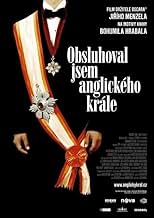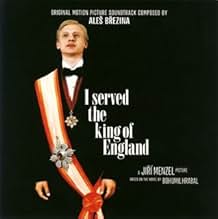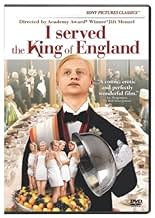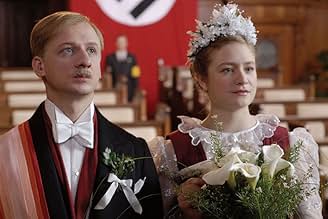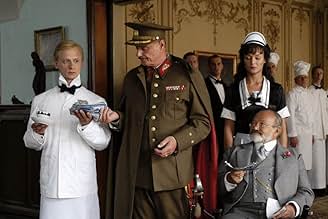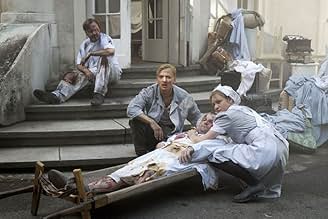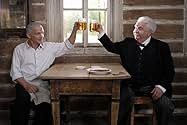IMDb RATING
7.3/10
8.4K
YOUR RATING
A look at the glamorous life at an old-world Prague hotel.A look at the glamorous life at an old-world Prague hotel.A look at the glamorous life at an old-world Prague hotel.
- Awards
- 12 wins & 13 nominations total
- Director
- Writers
- All cast & crew
- Production, box office & more at IMDbPro
Featured reviews
I got a bit of a shock when I saw this film. It doesn't seem to follow the rules of contemporary film-making--in other words, women aren't shown as fully equal to men (although they can be very resourceful in dealing with petty tyranny) and the hero shows no sign of resentment for the way he is treated. I felt a lot closer to the great works of the heyday of classic film by Cukor, Ophuls and Lubitsch. The story unfolds calmly and logically, whether the events take place in the 30's, 40's or 50's of the last century. Ivan Barnev as the young Jan is superb: funny, roguish and balletic (just watch how gracefully he swoops around the restaurant with that heavy tray; wonder how much rehearsal time that needed.) Jiri Menzel made Closely Watched Trains, then saw his career go into eclipse after the Soviet invasion in 1968. The work he has done since hasn't come to my attention until now. This may be his swan-song, since he is 70 now, but I hope not.
Obsluhoval jsem anglického krále (Jiří Menzel, 2006, 2h00) is very hard a movie to write on. Obviously, Bohumil Hrabal squares things up with Czech history or nationalism. His main character, brilliantly set up by Jiří Menzel (let's remember "Trains closely watched" and "The Aventures of private Ivan Tchonkin") is a sort of naive though ambitious petty crook, almost reaching his aim transformed into an ideal (becoming a millionaire) until History catch him back, after February 1948.
An older man, though not broken, is opening the movie : Jan is freed after serving 15 years ("which, thanks to amnesty, became 14 years and 9 months") in state prison. We follow older Jan Dite in Sudentenland, now a desert since Germans were expelled after WWII. He remembers his rise - mainly through women, generally whores, caring with him because his charm et his sweetness and invention in bed. This is the center of numerous flash-backs making the bigger part of the film. Nothing wrong to say about musical score, special effects (delicate and charming), casting (all women are beautiful), acting, filming and editing. Everything works, no flaws.
The problem, if there is a problem, lies in the hero and almost all of the characters he is mixed with : all are of a rather repulsively vulgar cynicism, which becomes the philosophy Jan uses to transform his first poor dream into an ideal. And those who are not of this kind are lead by nationalism - narrow minded (the Czechs) or hideous (the Nazi school-mistress Jan falls for). Oddly enough, the only one redeemed for us is the head waiter in Hotel Paris, who is Czech, righteous and courageous. Is it to tone down Hrabal's thesis?
So the whole story looks like an enormous bitter (and sophisticated) farce Menzel filmed on behalf of Hrabal's feelings.
Besides, there is still something in the movie, which make its vision not one-sided : a bitter-sweet taste given by the face of mature if not old men in front of women beauty, and the visible and overwhelming nostalgia this beauty vivify in their mind. They remember, and they smile... Isn't it there some kind of a sketch, the sketch of a how-to-grow-old handbook?
An older man, though not broken, is opening the movie : Jan is freed after serving 15 years ("which, thanks to amnesty, became 14 years and 9 months") in state prison. We follow older Jan Dite in Sudentenland, now a desert since Germans were expelled after WWII. He remembers his rise - mainly through women, generally whores, caring with him because his charm et his sweetness and invention in bed. This is the center of numerous flash-backs making the bigger part of the film. Nothing wrong to say about musical score, special effects (delicate and charming), casting (all women are beautiful), acting, filming and editing. Everything works, no flaws.
The problem, if there is a problem, lies in the hero and almost all of the characters he is mixed with : all are of a rather repulsively vulgar cynicism, which becomes the philosophy Jan uses to transform his first poor dream into an ideal. And those who are not of this kind are lead by nationalism - narrow minded (the Czechs) or hideous (the Nazi school-mistress Jan falls for). Oddly enough, the only one redeemed for us is the head waiter in Hotel Paris, who is Czech, righteous and courageous. Is it to tone down Hrabal's thesis?
So the whole story looks like an enormous bitter (and sophisticated) farce Menzel filmed on behalf of Hrabal's feelings.
Besides, there is still something in the movie, which make its vision not one-sided : a bitter-sweet taste given by the face of mature if not old men in front of women beauty, and the visible and overwhelming nostalgia this beauty vivify in their mind. They remember, and they smile... Isn't it there some kind of a sketch, the sketch of a how-to-grow-old handbook?
10sjbrook1
Like the butler played by Anthony Hopkins in the 1994 film "The Remains of the Day", the waiter at the centre of "I Served the King of England" (Jiri Menzel, Czech Republic, 2006) is not interested in politics. Major historical events surround him, yet these completely escape his attention. His ambition is simply to become a millionaire, like the fat cats he serves at table. In 1930s Prague, Hitler, in Berlin, is making a radio announcement about his aim to "liberate" the Sudetenland. Bored, Jan Dite, the waiter, simply turns the dial to a dance music station.
He manages to float through the Nazi invasion, first of the Sudetenland, then of Czechoslovakia. By a combination of hook and crook, he achieves his ambition of owning his own hotel through the sale of valuable stamps, stolen from a vanished Jewish family. This does not give him a moment's pause but later, when he sees a trainload of Jews in cattle-cars moving off to Auschwitz, he has a rush of compassion and chases after the train in an attempt to hand the deportees a sandwich. After the war, as a self-confessed millionaire, he is sent to prison when his hotel is nationalised. He emerges fifteen years later, older, but not much wiser. He is Schweik, but without the latter's sly intelligence.
This sketchy summary cannot do justice to a film which has been described as a near-flawless masterpiece, in which "Prague has never looked better". It is permeated with the ironic wit which marked Menzel's earlier films, such as the Academy Award winning Closely Watched Trains (1966). Dite befriends the German girl Liza, described by one reviewer as "the sweetest little Nazi in the history of the cinema". They are in bed, making love in the missionary position. Liza keeps pushing his head aside so that she can gaze at the big picture of Adolf Hitler on the opposite wall. Such was love in the Third Reich. The scene in which Dite is undergoing a racial fitness test which involves giving a sperm sample is intercut with young Czech men being unloaded from a lorry at an execution ground. Of this, Dite is blissfully unaware.
The Remains of the Day was based on a serious and perceptive novel by Kazuo Ishiguro. The genesis of I Served the King of England, by contrast, was a comic novel by Bohumil Hrabal, a book I cannot wait to get my hands on. Any offers?
He manages to float through the Nazi invasion, first of the Sudetenland, then of Czechoslovakia. By a combination of hook and crook, he achieves his ambition of owning his own hotel through the sale of valuable stamps, stolen from a vanished Jewish family. This does not give him a moment's pause but later, when he sees a trainload of Jews in cattle-cars moving off to Auschwitz, he has a rush of compassion and chases after the train in an attempt to hand the deportees a sandwich. After the war, as a self-confessed millionaire, he is sent to prison when his hotel is nationalised. He emerges fifteen years later, older, but not much wiser. He is Schweik, but without the latter's sly intelligence.
This sketchy summary cannot do justice to a film which has been described as a near-flawless masterpiece, in which "Prague has never looked better". It is permeated with the ironic wit which marked Menzel's earlier films, such as the Academy Award winning Closely Watched Trains (1966). Dite befriends the German girl Liza, described by one reviewer as "the sweetest little Nazi in the history of the cinema". They are in bed, making love in the missionary position. Liza keeps pushing his head aside so that she can gaze at the big picture of Adolf Hitler on the opposite wall. Such was love in the Third Reich. The scene in which Dite is undergoing a racial fitness test which involves giving a sperm sample is intercut with young Czech men being unloaded from a lorry at an execution ground. Of this, Dite is blissfully unaware.
The Remains of the Day was based on a serious and perceptive novel by Kazuo Ishiguro. The genesis of I Served the King of England, by contrast, was a comic novel by Bohumil Hrabal, a book I cannot wait to get my hands on. Any offers?
While filming a novel is always difficult.. I think this film captures the spirit of the novel.. one man' life as he succeeds and fails and survives and never seems to be really touched by the world events happening around him (the story starts in 1920's and ends mid-1960's) The actors are perfectly cast, especially the two actors playing Jan Dite. The cinematography is wonderful, as is the music. I have read the novel and I live in the Czech Republic, so I have familiarity with both the story and the culture, but I think the story is universal enough for all audiences to enjoy this film.
This is one of the biggest budget Czech films ever and you can see ALL of the money on the screen, costumes, sets and locations (including the beautiful Hotel Parziz in Prague, which is unchanged from when it was built!)
highly recommend this film to anyone who loves melancholy, sweet stories with a bit of political commentary thrown in for good measure....
This is one of the biggest budget Czech films ever and you can see ALL of the money on the screen, costumes, sets and locations (including the beautiful Hotel Parziz in Prague, which is unchanged from when it was built!)
highly recommend this film to anyone who loves melancholy, sweet stories with a bit of political commentary thrown in for good measure....
Menzel, faithful to Hrabal, shows the Fall of Czech Man - and Sudeten German Woman - and their expulsion from their respective Middle-European idylls: They tragically fall into each other's arms just as global issue is joined that soon disillusions our Romeo and destroys his (now unfortunately rampantly Nazi) Juliet.
Neither the quiet life of getting rich and enjoying all the pleasures money can bring, nor the stirring Wagnerian strains of Germanic supremacist idealism, can survive, but our opportunistic anti-hero, Ditie (a name which can translate as 'little man') is more adaptable, because his ideals are more pliant to the accidents of fate than his German wife's rigid Hitlerite fanaticism, and consequently he is eventually able to emerge from a sort of Communist Purgatory with a keen appreciation of life's real and much simpler necessities.
With profound irony, it is in a smashed and ethnically cleansed Sudeten German village that an older and a wiser Ditie's rehabilitation is completed. And it is from this sobering perspective that he can finally both regret the excesses and errors of his life, and yet also take nostalgic pleasure from what was, after all, the wonderful, glittering, profoundly human spectacle of folly and grandeur which his life has been! Far from tragic or depressing, therefore, this film of the 20th century debacle of a nation ruined remarkably concludes with a very Czech endorsement of the simple, inoffensive pleasure in life which will always console this patient people at the troubled heart of darkest Europe: Ditie allows himself to enjoy a tankard of Pilsener beer - and Menzel's camera seems to gild the moment with as much gloriously sensuous golden dreaminess and spiritual fulfillment as ever bloated millionaire or romantically excessive idealist knew.
At last, the little man has found his fulfillment where it always lay: in the little things. At last, old, disillusioned and unseduced any longer by the world's headier attractions, Ditie finds himself at home and happy.
Here, the film seems to be saying, is the real idyll to which the Czech person should retire for refreshment of the soul, and not those false - though fabulous - ones we have been forced to discard.
Just as Ditie observes that his own career of accidents always turned out well, so in this perspective the Czech experience seems, on the whole, to have turned out for the best. This optimistic fatalism seems typical of the Czech way of seeing things, and is as characteristic of this film of Menzel's old age as it was of his early masterpiece, 'Closely observed trains.' On this view, it would be churlish to condemn the film for self-indulgence, as many Western critics have done. Frankly, they haven't suffered so much, so what do they know of ethical conundrums and the moral paradoxes of survival? This meditation on the more inglorious struggles of the insignificant and friendless to survive deserves our respect, not an easy and priggish contempt. This must especially be true in the country which lies behind the heavily loaded title 'I served the King of England,' for this heavy hint must surely prick that particular national conscience with its role in one of history's most blatant acts of betrayal. The title practically dares any English commentator to judge Ditie in his historical predicament!
(There is also considerable satisfaction to be had by the viewer from the sheer technical finesse of the film's production, on every level. Jiri Menzel's craft is also hugely impressive in scene after scene, which are turned with complete mastery of tragi-comic effect. But this is a study for another occasion.)
Neither the quiet life of getting rich and enjoying all the pleasures money can bring, nor the stirring Wagnerian strains of Germanic supremacist idealism, can survive, but our opportunistic anti-hero, Ditie (a name which can translate as 'little man') is more adaptable, because his ideals are more pliant to the accidents of fate than his German wife's rigid Hitlerite fanaticism, and consequently he is eventually able to emerge from a sort of Communist Purgatory with a keen appreciation of life's real and much simpler necessities.
With profound irony, it is in a smashed and ethnically cleansed Sudeten German village that an older and a wiser Ditie's rehabilitation is completed. And it is from this sobering perspective that he can finally both regret the excesses and errors of his life, and yet also take nostalgic pleasure from what was, after all, the wonderful, glittering, profoundly human spectacle of folly and grandeur which his life has been! Far from tragic or depressing, therefore, this film of the 20th century debacle of a nation ruined remarkably concludes with a very Czech endorsement of the simple, inoffensive pleasure in life which will always console this patient people at the troubled heart of darkest Europe: Ditie allows himself to enjoy a tankard of Pilsener beer - and Menzel's camera seems to gild the moment with as much gloriously sensuous golden dreaminess and spiritual fulfillment as ever bloated millionaire or romantically excessive idealist knew.
At last, the little man has found his fulfillment where it always lay: in the little things. At last, old, disillusioned and unseduced any longer by the world's headier attractions, Ditie finds himself at home and happy.
Here, the film seems to be saying, is the real idyll to which the Czech person should retire for refreshment of the soul, and not those false - though fabulous - ones we have been forced to discard.
Just as Ditie observes that his own career of accidents always turned out well, so in this perspective the Czech experience seems, on the whole, to have turned out for the best. This optimistic fatalism seems typical of the Czech way of seeing things, and is as characteristic of this film of Menzel's old age as it was of his early masterpiece, 'Closely observed trains.' On this view, it would be churlish to condemn the film for self-indulgence, as many Western critics have done. Frankly, they haven't suffered so much, so what do they know of ethical conundrums and the moral paradoxes of survival? This meditation on the more inglorious struggles of the insignificant and friendless to survive deserves our respect, not an easy and priggish contempt. This must especially be true in the country which lies behind the heavily loaded title 'I served the King of England,' for this heavy hint must surely prick that particular national conscience with its role in one of history's most blatant acts of betrayal. The title practically dares any English commentator to judge Ditie in his historical predicament!
(There is also considerable satisfaction to be had by the viewer from the sheer technical finesse of the film's production, on every level. Jiri Menzel's craft is also hugely impressive in scene after scene, which are turned with complete mastery of tragi-comic effect. But this is a study for another occasion.)
Did you know
- TriviaThe scenes for the Hotel Pariz restaurant were filmed in the main restaurant in Prague's Obecni Dum (Civic House), just around the corner from the actual Hotel Pariz. Both restaurants were designed in the Art Nouveau style by artist Alphons Mucha, but the Obecni Dum restaurant is larger.
- GoofsJan sees a train full of people being deported to a concentration camp. A closeup of one of the cars shows men within wearing gray and white striped uniforms. However, deportees were sent to the camps wearing their civilian clothes and weren't issued uniforms until after they arrived.
- Quotes
Jan Díte, older: A person becomes most human, often against his own will, when he begins to founder, when he is derailed and deprived of order.
- ConnectionsEdited into CzechMate: In Search of Jirí Menzel (2018)
- How long is I Served the King of England?Powered by Alexa
Details
- Release date
- Countries of origin
- Official sites
- Languages
- Also known as
- I Served the King of England
- Filming locations
- Production companies
- See more company credits at IMDbPro
Box office
- Budget
- CZK 84,450,000 (estimated)
- Gross US & Canada
- $617,403
- Opening weekend US & Canada
- $53,218
- Aug 31, 2008
- Gross worldwide
- $7,354,478
- Runtime1 hour 53 minutes
- Color
- Sound mix
- Aspect ratio
- 1.85 : 1
Contribute to this page
Suggest an edit or add missing content

Top Gap
By what name was Moi qui ai servi le roi d'Angleterre (2006) officially released in Canada in English?
Answer

